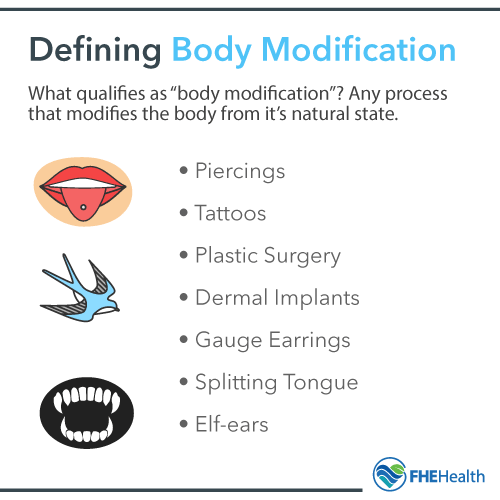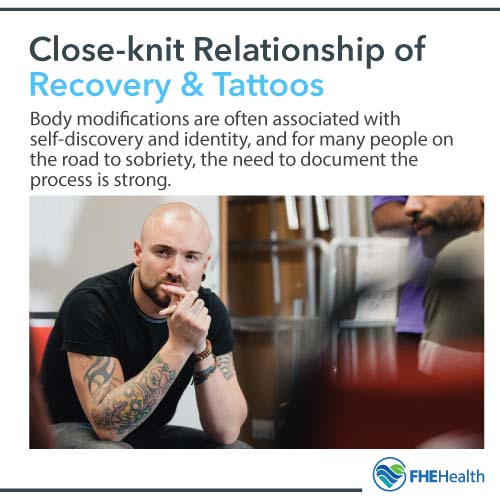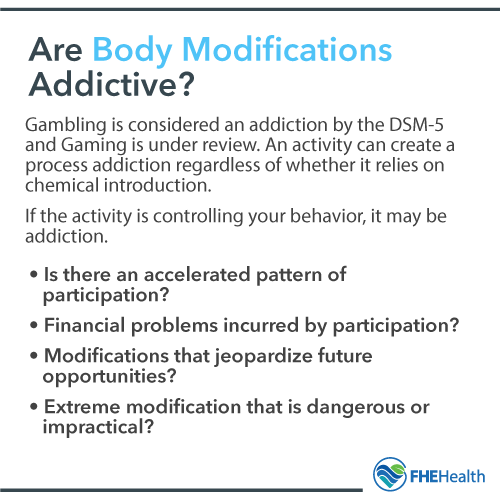
While once rare and unusual, body modification is now a part of mainstream American culture. Piercings can be placed almost anywhere: what was once limited to primarily the earlobe has now evolved, with options for the lips, nose, cheeks, and chin, as well as more unusual piercing choices, like corset piercings. Tattoos are also far more common than they were decades ago. Around half of all Americans have at least one tattoo, and half of those with tattoos have four or more. Some industries still see tattoos and piercings as unprofessional — finance and law, for example, may still consider a clean-cut appearance essential for employment — but many have relaxed on the topic and are willing to accept employees regardless of the presence of body modifications.
By and large, body modifications are safe if properly cleaned and cared for, but there is a line. When body modifications become tied to mental health or are creating emotional issues, a love of tattoos may have evolved from interest to addiction.
What Is Body Modification?
 Body modification refers to any process that modifies the body from its natural state. Body modification generally describes tattoos and piercings but can extend to other, more extreme alternatives, like filing the edges of teeth to make them pointed, surgically created elf ears, split tongues or implanted devil-like horns. For the average person, a tattoo or two and ear piercings are the limit, but this can vary greatly from one person to another.
Body modification refers to any process that modifies the body from its natural state. Body modification generally describes tattoos and piercings but can extend to other, more extreme alternatives, like filing the edges of teeth to make them pointed, surgically created elf ears, split tongues or implanted devil-like horns. For the average person, a tattoo or two and ear piercings are the limit, but this can vary greatly from one person to another.
Some forms of body modifications are rather temporary. Piercings will often close if not used for several months or years, and the appearance of tattoos can be reduced or eliminated through the use of costly laser treatments. Others, however, are hard to reverse. Implants and more extreme piercing choices, like ear gauging — the process of using larger earrings over time to expand the hole in the earlobe — may only be corrected through surgery. An extreme number of tattoos can also be virtually impossible to remove; take, for example, Lucky Diamond Rich, an Australian man who has 100% of his visible skin tattooed. In this instance, removing his tattoos isn’t feasible.
Body Modification and the Recovery Community
 If you are an active part of the recovery community, you may have noticed that body modification is extremely common. Tattoos, in particular, are prevalent in those attempting to overcome an addiction to drugs or alcohol for a number of reasons.
If you are an active part of the recovery community, you may have noticed that body modification is extremely common. Tattoos, in particular, are prevalent in those attempting to overcome an addiction to drugs or alcohol for a number of reasons.
Body modifications are often associated with self-discovery and identity, and for many people on the road to sobriety, the need to document the process is strong. While generally not recommended due to the changes in the emotional state following addiction, sobriety tattoos are extremely popular. Seen as a way to mark the journey getting sober takes, many in recovery favor things like the date treatment began, symbols like the phoenix or anything else reminiscent of the escape from substance abuse. Those who have been through rehabilitation more than once may choose to commemorate all efforts, leading to a large number of tattoos over the course of several years. Recovering users may also choose to change their appearances following treatment, both to mark the start of a new life and to create distance between who they are now and who they used to be. This can lead to tattoos, piercings, new hairstyles or hair colors and even a change in wardrobe.
Many users also get tattoos or piercings prior to entering treatment. As body modifications still maintain a reputation as a way to rebel against societal expectations, it’s not unusual that those engaging in other rebellious behavior would take additional steps down this road.
Tattoo Addiction
Any pleasurable behavior, from shopping to gambling to sex, can be addictive, and this includes tattoos. These activities do not require an external chemical to meet the threshold for an addiction, they simply must take on the characteristics of a process addiction. For some people, getting tattoos and making further changes to the body can indeed be an addiction, creating new and complex issues for those in recovery.
Challenges with Addiction
As with all addictions, an addiction to tattoos starts small, usually with a single small tattoo early in young adulthood. However, this can quickly begin to spiral, particularly for those who have friends with many tattoos. Body modifications may seem like a necessity to fit in, leading to an increase in piercings and tattoos simply to feel like a member of a social group.
Some people can live with a few tattoos without a strong urge to get more, but tying tattoos to emotions or circumstances can lead to a rapid acceleration in body modification decisions. This is particularly true if tattoos are tied to milestones in life like sobriety. Some people also experience an endorphin rush during the body modification process, creating a strong want for further piercings or tattoos. Further, body modification can align with co-occurring disorders like body dysmorphic disorder, indicating other mental health issues.
A few tattoos, or even many tattoos, can be normal, especially for those navigating the struggles of recovery. However, when plans for body modification begin to take over, a problem may be present.
Signs of Addiction to Body Modification
Like all addictions, there are many signs to watch for in those who may suspect a tattoo or piercing addiction in themselves or their loved ones. These include:
- Accelerated modification patterns, like going from a tattoo a year to several over the course of a few months
- Financial problems from spending on increased modifications
- Tattoos in inappropriate locations, like the face, that could seriously jeopardize employment in traditional circumstances
- Extreme proliferation of body modification, like a dozen facial piercings or multiple gauges in the same ear
- Extreme body modification practices, like corset piercings, eye dyeing and tongue splitting
- Consistent talking or thinking about future modification plans, particularly at inopportune times
- Missing work or obligations due to getting tattoos or piercings
- Allowing work to suffer due to planning or daydreaming about new modifications
Identifying Healthy Behavior
 It’s important to understand that extensive body modification isn’t necessarily unhealthy. Many people manage to be heavily tattooed and live a normal life without body modification playing a dominating role. Extensive body modification will not necessarily detract from important career choices or interfere with meaningful work, either. Hannah Shaw, better known as Kitten Lady, is a neonatal kitten rescuer and animal advocate who speaks nationwide about increasing community involvement in animal welfare. In spite of her heavily tattooed appearance, she has had the opportunity to take on important work, including speaking in front of Congress to defend legislation stopping animal testing in government research.
It’s important to understand that extensive body modification isn’t necessarily unhealthy. Many people manage to be heavily tattooed and live a normal life without body modification playing a dominating role. Extensive body modification will not necessarily detract from important career choices or interfere with meaningful work, either. Hannah Shaw, better known as Kitten Lady, is a neonatal kitten rescuer and animal advocate who speaks nationwide about increasing community involvement in animal welfare. In spite of her heavily tattooed appearance, she has had the opportunity to take on important work, including speaking in front of Congress to defend legislation stopping animal testing in government research.
Just as with alcohol use, for example, body modifications can be healthy in moderation. A desire for tattoos can be a normal outlet for self-expression or a way to participate in counterculture movements with no risk of harm. However, it is important to be aware of the above warning signs to be sure interest isn’t crossing the line into addiction. Body modification isn’t naturally a sign of mental illness, but it may be for those who cannot hold themselves to normal limits.
Seeking Help for Tattoos and Addiction
Even though tattoos are ostensibly safer than drugs or alcohol, it’s never a good idea to replace one addiction with another. Body modification is a normal part of life in recovery and is a generally healthy form of self-expression, but taking it too far may mean that your fascination has crossed the line. Tattoos and piercings should generally be enjoyed in moderation, much like other substances.






